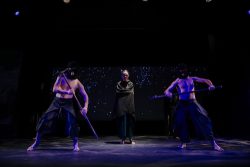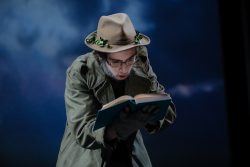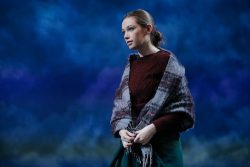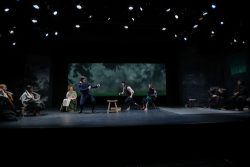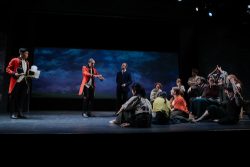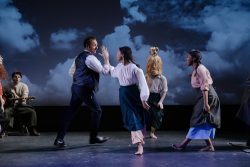Last night, staff writer Abby Rubel went to the Barnard Theatre Department’s production of Translations, directed by Barnard lecturer Sharon Fogarty. It runs through Saturday, December 9.
I walked into Translations unsure of what to expect. The Facebook event page only told me that it was “a modern historical parable of the brutality of rule,” and I was reluctant to Google further lest I be inadvertently spoiled. But a brief note in the program from Dramaturg Luke Cregan (CC ’19) hinted at what to expect–a play that explored a cultural identity crisis through the British control of Ireland. As someone almost completely unfamiliar with Irish history, this note helped me understand the history the play deals with rather than thrusting me into it unprepared.
The play opens with a movement piece, with most of the cast assembled on the stage and Arielle Firestone’s (JTS/GS ’19) lovely voice as the only accompaniment. Aside from the absolutely gorgeous singing, I didn’t think this piece added much to the play and only served to confuse me from the beginning because it didn’t provide any context for the play to come.
Luckily, the play’s plot was fairly straightforward. The British army was mapping Ireland and, in the process, Anglicizing all the Gaelic names and erasing the Irish identity. In the midst of this culture war, the community of Baile Beag (pronounced something like “Balleyuh Bay”) welcomed home Owen, the son of the schoolteacher and town drunk. Owen, played by Brandon Walsh (GS ’18), had abandoned his community to work with the army as a translator since almost no one in Ireland knows English. (At least, that is the impression the play gave.) A native Irishman, he was participating in the destruction of his culture. He particularly came into conflict with his brother, Manus, portrayed by Daniel Kvoras (GS ’19), who accused him of selling out. Owen brought with him two English soldiers: Lancey, played by Rupert Fennessy (CC ’21), and Yolland, played by Jesse Cao (CC ‘20). Yolland fell in love with Máire (pronounced Moire), played by Chloé Worthington (BC ’18), which is problematic both because they don’t speak the same language and because Manus already had his eye on her.
Overall, the student cast performed excellently. Owen was initially hard to like as the cold-hearted destructor of all his brother held dear, but Walsh soon had me warming to him by carefully portraying the conflict Owen felt as the play developed. Worthington milked Máire’s few comic moments for all they were worth, especially in her linguistically confused interactions with Yolland, but also managed to bring gravitas to the role. Genevieve Henderson portrayed an impressive set of pipes as Sarah, a girl who struggles to speak at all but conjures some incredibly loud yells when necessary.
My personal favorite, however, was Fennessy, who both managed to portray an uptight Englishman in the style of Basil Fawlty while also completely terrifying me with his intense seriousness at the end of the play. A scene in the beginning of the play, when he tries to explain to the people of Baile Beag what he is doing in their community, was hilarious. A later scene in which Lancey threatens to kill the community’s livestock was the polar opposite. Yet Fennessy manages to encompass both personas, so when Lancey makes his threats at the end, you can see how that man was there all along.
As the title suggests, Translations explored themes of cultural translation. This was expressed most directly through the fact that, though all the actors spoke English for the whole play, whenever an Irish character and an English character were conversing, they had to pretend not to understand each other. While this was an effective device, it was sometimes hard to follow which language Owen was using when talking to both a soldier and a Gaelic speaker, or when Manus, who also speaks English, refused to use it to talk to Yolland while (from the audience’s perspective) speaking it to Owen. The actors, however, mitigated this quite a bit. Cao looked perpetually confused whenever Manus was supposed to be speaking Gaelic; it was a pleasure to watch Walsh literally talk out of both sides of his mouth as he mistranslated the soldiers for the community members. Overall, however, the issues the play explored were relatively easy to grasp, even if they are not easy to solve.
The play had a number of highlights. A dance scene was immense fun, featuring live music from Kvoras and Juliana Forrest (GS ’19) that had me tapping my foot. All the actors had Irish accents, almost all of which sounded very good to my untrained ear. The set, which was generally fairly simple, featured a backdrop of a sky that changed as the play’s mood changed. It provided foreshadowing as well as bringing some much-needed drama to a set that otherwise barely changed. The chemistry between Walsh and Kvoras was also quite nice. They seemed very much like brothers—disagreeing on fundamental issues, but protecting each other nonetheless.
The chemistry between Worthington and Cao, however, was lacking. The romance between the two was one of the core relationships in the play, but they didn’t seem quite natural together. They had some good moments, especially during the group dance, but alone together they felt stilted. A scene after the dance, when they tried to teach the other a little bit of their language, was too reminiscent of “me Tarzan, you Jane” for my taste. While Kvoras was excellent in many respects, his character had a limp that faded in and out as the show went on or as various characters called attention to it. And, while I won’t spoil the ending too much, the production ended with a movement piece that, while poignant in some ways, didn’t quite fit with the rest of the play.
You can catch Translations tonight at 8 pm and tomorrow at 3 pm and 8 pm at The Minor Latham Playhouse. Tickets are $12 general admission or $6 with a BC/CUID.
- Still not sure what this opening meant.
- Local scholar Jimmy Jack reads his Homer.
- Worthington as Máire.
- Owen returns home.
- Lancey explains what a map is.
- This dance seemed a lot more fun than what I do in EC on weekends.
Photos by Stephen Yang


 0 Comments
0 Comments